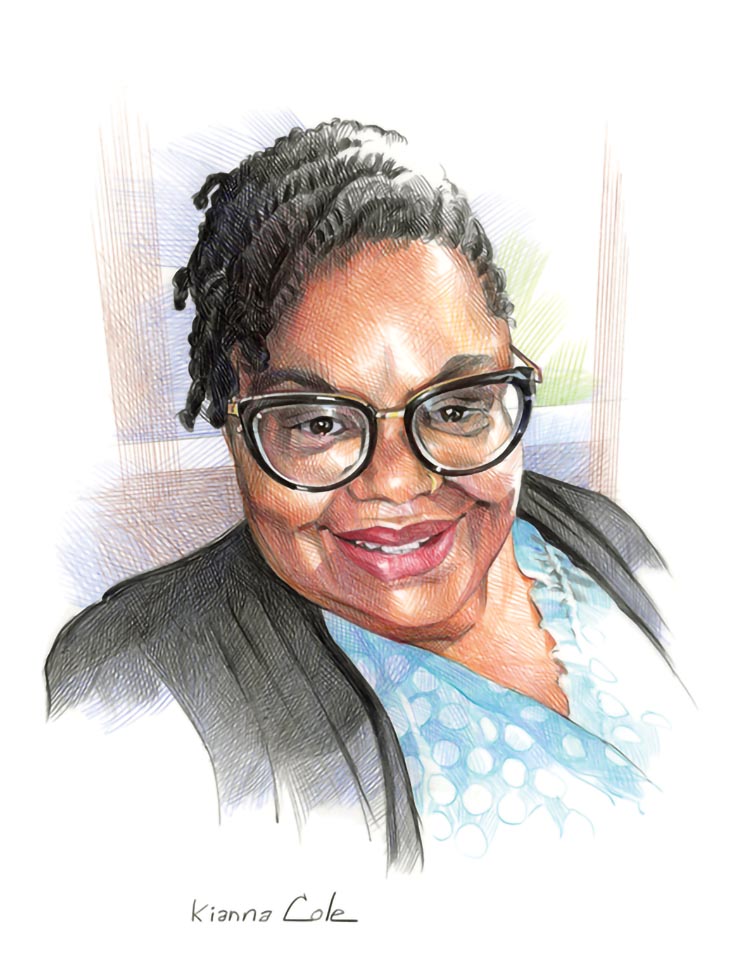Through her work with incarcerated individuals and veterans, she’s helped others transition back into society.

When Kianna Cole ’99 was a first-year at Colgate, she took a course with Assistant Professor of Education Denise Taliaferro called Social Deviance. The course, a sociology elective, discussed the ways in which “deviant behavior” — such as substance abuse and violent crime — manifested in modern society. In learning about the theoretical explanations for why a person engages in certain behavior, Cole began to wonder: How can society help those who struggle with deviant behavior exist safely in the world?
As part of the class, students read about marginalized groups, including incarcerated individuals in state prisons. Learning about their backgrounds was enlightening for the Colgate sociology and anthropology major: “[Their backgrounds were] similar to mine because most of the people who are in prison are people of color, who come from disadvantaged, lower socioeconomic classes, and that’s where I come from too,” Cole says. “I felt a kind of kinship with that particular group.”
At the same time, Cole was attending therapy sessions with Mark Thompson, then-director of counseling and psychological services at Colgate. “Through my work with him and dealing with some of my issues as a kid, he told me I would make a good therapist.” She decided to combine these two interests for her course’s final project, focusing on an intervention that would aid incarcerated individuals in reacclimating to society upon release. Fifteen years later, as the Onondaga County (N.Y.) Reentry Task Force coordinator, Cole implemented that program. As a licensed clinical social worker and therapist, Cole made it her career goal to help people struggling with mental health issues and social deviance reenter society.
The Supporting Offenders After Release (SOAR) program helped incarcerated individuals transition back into the community upon release from prison. With SOAR, Cole set out to reduce recidivism — in her role as project manager, she performed outreach to incarcerated individuals, hired and trained staff members, and wrote the grant that funded the program, among other tasks. After getting the program off the ground, Cole pivoted to a role within the maximum-security Auburn (N.Y.) Correctional Facility, providing specialized mental health interventions to men at the prison. For example, she worked with severely and persistently mentally ill incarcerated individuals who were due to be released soon, implementing interventions to help get them ready to go home. Those interventions included group therapy, individual sessions, setting up post-release doctor’s appointments, and referrals to housing and other service providers. “We helped a lot of guys coming out of prison to get their lives together when they got out,” she says.
Today, Cole is a social worker at the Syracuse VA Medical Center’s substance use disorder clinic, which treats gambling, sex, substance, and other addictions. The outpatient clinic assesses veterans’ needs and treats them for their addictions, referring them to higher levels of care if needed.
Though the job is different from what she envisioned all those years ago on campus, it allows her to connect with a new group of people who can benefit from her clinical skills. Also, as the largest employer of social workers in the country, the VA provides unrivaled support for her work, Cole says. “What made me interested in [this position] is the opportunity to do more clinical work, because in the prison, you’re doing therapy, but you really only get 15 minutes with each person,” she notes. She’s drawn to the opportunity to connect with her patients: “My job is to encourage somebody to do something really hard [and convince them] that it’s what’s best for them.
“Also, it’s an honor to serve these veterans when they’ve done so much for our country.”
